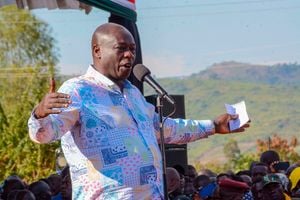Where’s our Kadhi’s court? Muslims in Mumias wonder

Nabongo sports gound in Mumias.
Muslim residents of Mumias town are an unhappy lot. They say the town is the heart of Islam in Western region yet it lacks one key institution: a Kadhi’s court.
How the local Muslim population came to be goes back to the 1800s. Muslim traders coming from the coast introduced the religion to the western region between 1870 and 1885. Chief Nabongo Mumia of Wanga accorded the Swahili traders a warm welcome and they helped him overcome his enemies during inter-ethnic wars.
In return, Chief Mumia, his family and officials of his court converted to Islam. Henceforth, Islam spread to the surrounding areas of Kakamega, Kisumu, Kisii and Bungoma.
Owing to this rich history, the Muslim community has an established a presence in Mumias town because of pre-independence trade links between the Wanga Kingdom and the coast.
From start
Sheikh Khalid Burhan, an Islam scholar from the region, and Mzee Musa Athman Bilal, argue that Mumias merited having a Kadhi’s court from the onset of the courts in 1963 in order to apply Islamic law.
The court governs over matters of marriage, divorce and succession among Muslims. In some cases, it extends to matters within the Children’s Act that was passed in 2001, whether civil or criminal.
Sheikh Burhan notes that the Kadhi’s court has jurisdiction to hear cases related to custody of children if there is no big argument between the parties.
Raised concern
Given that there were Muslims involved in the negotiation for the inclusion of the Kadhi's courts in the Independent and the 2010 Constitution, this has raised concern among Muslim elders in Mumias who have asked why the town still lacks the key institution despite having the largest Muslim population in the western region.
“The number of Muslims in Mumias area overwhelms that in Bungoma, Kakamega and even Kisumu. In fact, many cases handled by the Kadhi's court in Kakamega are from Mumias. Let the Judicial Commission assist us establish a Kadhi's court here,” said Mr Burhan.
Let the Judicial Commission assist us.
Mzee Bilal, 81, says that during King Mumia’s reign, there were Kadhi’s courts from Mumias but they were transferred and the vacuum has not been filled.
“We had Sheikh Shariff Omar Abdallah who was the first Kadhi in Mumias but was transferred to Kisumu in the early 90s,” said Mzee Bilal.
He says Sheikh Omar used to attend courts in Mumias to assist in resolving matters.
“We, therefore, call upon the Judicial Service Commission to consider establishing a Kadhi's court in Mumias to cut on costs incurred by Muslims seeking justice on matters that require the court,” he added.
He said Muslims were facing challenges in solving disputes that require intervention from the Kadhi's court.





